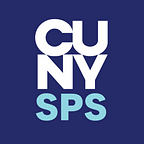Visions of New Solidarities
CUNY SPS Youth Studies faculty member Dr. Elizabeth Bishop discusses her new book on racial justice
CUNY SPS is excited to announce the publication of the book Whiting Out: Writing on Vulnerability, Racism and Repair, which was recently published by CUNY SPS Youth Studies faculty member Dr. Elizabeth Bishop.
As noted in the book description, Whiting Out is an experimental text that seeks to collapse the space that white writers create between ourselves and our ideas when writing about race, identity, history, responsibility, positionality, power, and the present. The book is written as a first-person meditation grounded in a poetics of vulnerability, undertaken as an author study in two major parts — fragmented first through the work of James Baldwin and then refracted through the writing of Gloria E. Anzaldúa. Whiting Out is for both aspiring and experienced teachers (especially white folks), as well as anyone open to writing new narratives and imagining new possible worlds.
To delve deeper into the radical ideas explored by Dr. Bishop in her book, the CUNY SPS Youth Studies program hosted a book launch panel discussion this spring. During the lively talk, entitled “Go For Broke: Visions of New Solidarities,” Dr. Bishop was joined by scholar-activists Wendy Barrales, Damaris Dunn, and Sarah Zeller-Berkman, academic director of youth studies programs at CUNY SPS, to discuss critical youth development and how to forge new solidarities that shape a brighter future and help drive change.
In connection with this publication and event, Dr. Bishop also recently spoke with CUNY SPS about the book, her current book tour, and the philosophy that drives her.
Q: Congratulations on publishing your new book Whiting Out: Writing on Vulnerability, Racism and Repair. Please tell us a bit about yourself, and your background.
A: Dr. Elizabeth Bishop (she/they/Dr). I identify as a queer anti-racist educator, writer, researcher, anarchist, and co-conspirator.
Q: What inspired you to write the book, and what were your goals in writing this book?
A: This book project was personal for me. It came out of deep moments of reflection, retroactive analysis, and a desire to work/live/love in explicitly right relationship to the people of color in my life including students, co-workers, friends, and chosen family. My major goal was to externalize an internal process, to model a sort of thinking that called white-identified educators into the struggle to work for racial and gender justice in our lives.
Q: Your book details the profound effect that James Baldwin’s work had on you. Please tell us about how his writings influence your pedagogy today.
A: The biggest thing I can say about Baldwin is that his stark poetic prose, always both lovingly elegant and confrontationally damning, has called me in across his thousands of printed pages to reckon with the ways that white supremacy has lived on in me and how I can actively confront the harm of that legacy, to participate in co-conspiratorial world building in principled practice in thick intersectional solidarities.
Q: Your recent panel is titled “Going for Broke: New Visions of New Solidarities.” How is the discussion will be similar to and different from your text?
A: The book is intentionally time-stamped to contextualize the publication of those pages in the historical moments in which I was writing, from the locales from within which I was reckoning. The panels, in contrast, are a real opportunity of co-creation — to invite in some of the wisest, most daring, and radically loving scholars I know into dialogue about what metaphorical sticks of dynamite we need to be throwing to crack open conversations we need to have. For me, this is about committing to practices that lead to collective liberation that explicitly hold Black girls as well as queer/trans/nonbinary youth and educators of color squarely at the center of any strategic and tactical moves toward embodied solidarities across our curricula, classrooms, publications, and intergenerational organizing.
Q: You have been doing similar panel discussions since your book’s release. Where else have you held panel discussions related to your book?
A: All of the panels I have done have rotated around the idea of “Going for Broke” which is a direct reference to the 1963 publication of James Baldwin’s “A Talk to Teachers,” where he says that those of us who consider ourselves “responsible” — particularly those of us who “deal with the minds and hearts of young people” will have to be prepared to “go for broke.” I wanted to know what the wide range of scholars I have invited and admire (especially the critical-emancipatory women of color scholars who have joined me on this tour) offer as answers to Baldwin’s charge to go for broke. It has been illuminating. I think it will be a future book, to carry this conversation further.
Q: What do you hope to achieve with these panel discussions?
A: I want to inspire critical love, critical humility, cautious optimism, radical hope, and strategic dreaming in community. I want to call the audience in to work in principled practice to disrupt white supremacy and rid traces of fascism from the body politic and our politicized bodies.
Q: What are your long-term, over-arching goals?
A: Someone else asked me a version of this question that I want to uplift my same answer to here: “Teach. Love well. Take care of my people and their people. Understand the long fight in the struggle for intersectional gender and racial justice. Walk away from big tech surveillance for purposes of movement building. Speak truth to power. Elevate moments of joy and celebration. Be surprised by all that is surprising, that offers new trajectories for me/us to move in world building.”
Q: You have a very literary name. Were you named after the poet?
A: I have the same initials as both of my grandmothers. Ancestral remembrance.
Dr. Bishop’s book is available for purchase on the publisher’s website.
